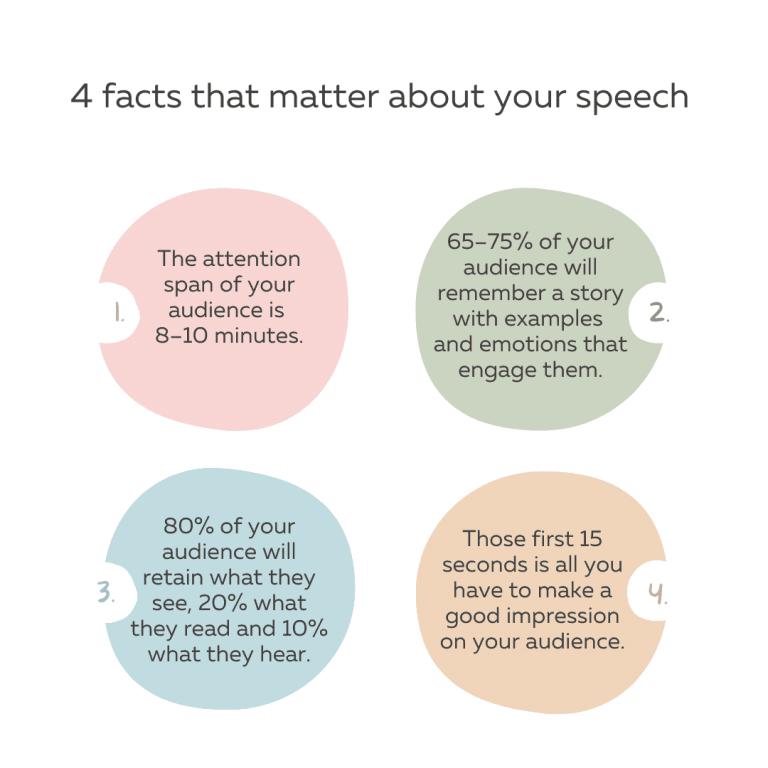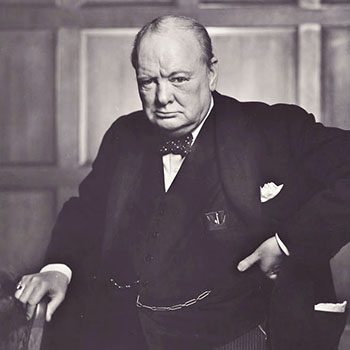If you want to write a great speech that has a lasting impact on your audience, you’re going to need more than fancy words.
You’ll need to:
1.
Use eye contact, body language, a warm tone of voice and facial expressions.
2.
Acknowledge and engage your audience.
3.
Add current research, data and even personal observations.
4.
Include storytelling and practise it with friends first; people love a good story.
5.
Create a change of pace every 10 minutes, so people don’t lose interest.
6.
Practise and deliver a great ‘wow’ moment.
7.
Start strong and finish on time.
It’s not easy to write a great speech if you approach it as if you’re writing an essay.
Your audience won’t see punctuation marks on a written page. It will be up to you to convey the commas and exclamation marks throughout your delivery.
As John Coleman writes ‘when delivering a speech, you are your punctuation’.
In order to write a great speech, you need to understand your audience’s emotional reactions and physical capabilities. Remember, the speech is for them, not you.

One of the greatest speeches ever written was delivered by Winston Churchill in 1940. It was so powerful it changed hearts and minds.
When Churchill took over the reins of power, things were looking very grim for the cause of human freedom.
The Germans had just triumphed over the Allies in France and the British army only barely slipped away at Dunkirk, abandoning its heavy weapons and equipment.
In London, a pro-appeasement faction within the British cabinet was arguing for peace negotiations with Hitler.
But Churchill rejected this defeatist advice and rose to the dispatch box in the House of Commons where he gave a speech that literally changed the course of history.

One observer described this event in his diary as: ‘a magnificent oration, which obviously moved the House’.
Another MP wrote that the prime minister’s words were ‘worth 1000 guns and the speeches of 1000 years’.
By the time Churchill resumed his seat, the entire landscape of British politics had shifted.
The push for appeasement evaporated and the nation resolved to fight on against Nazi Germany. We know now that this saved Western civilisation.
While the challenges faced by corporate communications departments may not be so dramatic these days, the need to convey a coherent message in eloquent form remains important.
When you write a speech, you’re applying a distinct discipline that requires a particular suite of talents and experience.
Speechwriting requires a different set of skills than those you’d use to write office communications content.
A great speech should be almost poetic, imbued with a rhythmic quality that enlivens and inspires.
When it’s done, the audience should be left thinking and talking about what’s been said and the way it was said.
For those special events, such as a retirement dinner or annual general meeting, truly memorable words can make a big difference.
Let’s look in detail at how to write a great speech.
It’s been said that you have only one opportunity to make a first impression.
That means only one chance to pique the interest of your audience, and it’s at the beginning.
Start with a strong ‘hook’ because if you lose your listeners at the beginning, you’ll never get them back.
Use colourful, evocative language to generate powerful images that will resonate with your audience.
A tremendous example of this can be found in one of Barack Obama’s most famous speeches. He used potent imagery to describe the marches from Selma to Montgomery, led by Martin Luther King Jr, in support of voting rights for all African Americans.

The 1996 French film Ridicule tells a story about the court of Louis XVI at Versailles, where status was dependent on a witty tongue.
While a well-directed quip might elevate you in Royal favour, any resort to pun brought social death.
What’s the difference? It’s originality.
Always try to be creative in your use of language.
Overused phrases and clichéd expressions will consign your words to mediocrity.
Try to confine your speech to a single major theme.
Subsidiary themes may be woven into the text, but only if they support and illustrate the primary story you’re trying to tell.
A scattershot approach to writing a speech will make the end product superficial and that, in turn, will make your words eminently forgettable.
When you write a speech, conclude with a tug at the heart strings.
It could be an uplifting invocation of your company’s founding principles.
Or perhaps a heartfelt appeal on behalf of your favourite charity.

Perhaps a further display of your authenticity, where you let down your guard a little and share something personal.
However you end your speech, remember that ending on an emotive note will make your words resonate with the audience long after your speech is over.
The speechwriter has many rhetorical devices that, when used in the right place and at the right time, make words powerful and memorable.
Tricolon is the use of words, phrases, examples, or the beginnings or endings of phrases or sentences in threes – as in ‘government of the people, by the people, for the people’ (Abraham Lincoln), or ‘never in the history of human endeavour has so much been owed by so many to so few’ (Winston Churchill).
Alliteration is the repeated sound of the first or second letter in a series of words, or the repetition of the same letter sounds in stressed syllables of a phrase, as in the line from Coleridge’s ‘Rime of the ancient mariner’ – ‘for the sky and the sea, and the sea and the sky.’
Rhyme is a repetition of similar sounds (or the same sound) in two or more words.
This is most often in the final syllables of lines in poems and songs.
Metaphor is a juxtaposition of two distinct things that asserts they are essentially the same; as in the ancient Greek saying ‘fame is but the perfume of heroic deeds’.
Antithesis is the technique of contrasting two different ideas in the same sentence or two consecutive sentences; as in ‘speech is silver but silence is golden.’
Chiasmus is a very effective technique where the words in one phrase or clause are reversed in the next; as in ‘just because you’re born in the slum does not mean the slum is born in you.’
Simile is comparing two things that use the preposition ‘like’ or ‘as’ to highlight their similarities.
An example is in the words of poet Robert Burns when he wrote: ‘O my Luve’s like a red, red rose that’s newly sprung in June.’
To measure the number of words you speak in a minute or 10, check the Words to Minutes calculator.
If you’re after an accurate webpage word count, see the Web Page Word Counter.
When you write a speech it’s more art than science, and it’s an art that requires a particular suite of expertise and experience.
If you want to write a great speech, take the time to read and watch well-known speeches and analyse those elements that made them unforgettable.
To read more about writing a speech, you can go to this page on the Textshop website.
Also see our blog post on How to make your writing more powerful.
You can organise a chat with our resident speechwriter by pressing the button below.
